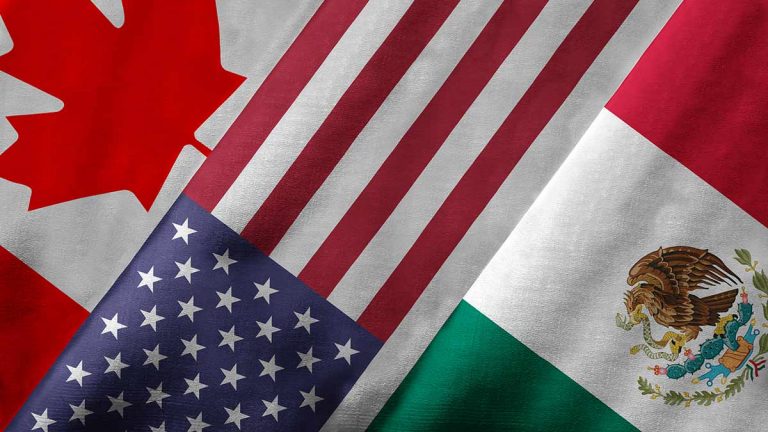The North American Free Trade Agreement has been a frequent target of criticism from Donald Trump. He has called it a “catastrophe” and a very bad deal for Americans. Most recently, he has threatened to scrap the agreement altogether over Canada’s protectionist policies for dairy products.
Fortunately for those of us who like consumer choice, cooler heads appear to have prevailed. Following a meeting with the president of Mexico and the prime minister of Canada, Trump has agreed not to unilaterally dissolve the treaty, but continues to express the desire to renegotiate it. This is progress.
What would such a renegotiation look like? It’s difficult to say, as it would not only involve our government’s demands, but those of Canada and Mexico as well. Given the text of recent trade proposals such as the Trans-Pacific Partnership, I’m skeptical that much good could come from updating NAFTA’s comparatively clean language.
Nevertheless, NAFTA is not without its faults. Like any multilateral trade agreement, it represents not free trade, but managed trade, and that management can always stand to be relaxed a bit more. In the spirit of optimism, then, I’ve compiled my top five improvements I would like to see in NAFTA.
1. Reduce Carveouts and Exemptions
Like any government negotiation, trade deals are not immune to the armies of lobbyists eager to get special protection for their industries. While the bulk of NAFTA is concerned with reducing trade barriers, eliminating tariffs, and making it easier to buy and sell across national borders, it still contains numerous exemptions for favored industries.
For example, under the agreement, Canada is still permitted to levy tariffs on lumber, fish, and certain agricultural products. Mexico receives a long list of exceptions for various food products. These exemptions not only increase the price of goods for consumers, but they create an unequal playing field in which government is protecting some producers at the expense of others. NAFTA could be improved by reducing trade barriers for all industries equally.
2. Simplify
Part of NAFTA allows the member countries to apply for waivers for various trade restrictions, a process that involves the need for committees to grant approval, not to mention the administrative cost of applications. Instead of requiring a cumbersome waiver process, why not make exemption automatic? Simplification would reduce costs and bureaucracy and open up more options for consumers.
3. Reduce Standardization
NAFTA requires most products sold across borders to meet certain international standards, or be certified as having equivalent standards to domestic products. While this is ostensibly done to promote safety, it can cause problems for importers. For example, Kerrygold butter from Ireland was recently banned from being sold in Wisconsin due to the lack of a “Grade A” standard used by Irish producers.
Recognizing that different countries use different standards, not just in terms of quality, but in terms of measurement, it would be better to let consumers decide which products they are willing to buy, rather than impede trade with often meaningless standardization.
4. Make Licensing Requirements Reciprocal
The services Americans can purchase from foreign nationals, and vice versa, are limited by licensing requirements. While NAFTA contains provisions for allowing professionals to obtain licenses across borders, no effort is made to avoid duplication of labor and recognize licenses granted by a foreign government, even when they are up to the standards of our own requirements. As a result, Americans miss out on professional services offered by Canadians and Mexicans, who could otherwise be providing valuable competition and choice.
Professional licensing remains a major barrier to entry supported by unions and trade associations. Allowing some degree of reciprocity between partner countries would benefit consumers considerably.
5. Reform Intellectual Property Laws
One of the worst sections of the Trans-Pacific Partnership, Barack Obama’s proposed trade agreement with multiple countries, was that dealing with intellectual property. The United States suffers from overly restrictive copyright and patent laws that have gradually grown from reasonable attempts to encourage innovation into the tools of lobbyists to prohibit competition and maintain monopolies for obscene amounts of time. Exporting our bad IP laws to other countries, especially developing ones, can do great harm to global commerce.
While not nearly as bad as TPP, NAFTA does contain some intellectual property requirements that could stand revision. In particular, the copyright section mandates excessively long lengths of protection, which could be shortened, or at least left up to individual countries to decide.
After re-familiarizing myself with NAFTA, I remain convinced that it is a pretty good deal. The biggest danger in renegotiating it is making things worse. If TPP is any model, each of the above concerns may well go in the wrong direction. The good news is that Trump was famously critical of TPP. The bad news is that we know he is a protectionist at heart, who regards trade not as a mutual beneficial exchange, but as a zero-sum game in which one party wins and the other loses. One can only hope that any renegotiation that takes place focuses on giving producers and consumers more freedom, not less.
This article originally appeared on Conservative Review.














Add comment